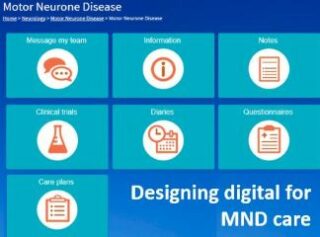Q Exchange
Coproduced optimisation of Motor Neurone Disease virtual care pathway
- Proposal
- 2019

Meet the team
Also:
- Dr Chris Kipps
- Dr Ashwin Pinto
- Claire Erridge
- Sallyann Smith
- Alex Young
What is the challenge your project is going to address and how does it connect to your chosen theme?
MND is a rapidly progressive, life-limiting disease with limb weakness, difficult swallowing and breathing, reduced cognition and requires high levels of complex care over short timescales. Current care is provided simultaneously by acute and community teams (neurologists, specialist nurses and nutrition, speech and physical therapists). Care is also provided by primary, social and palliative care.
Care co-ordination across multiple teams is challenging for patients, carers and clinical staff
Patient centric, digital care, empowers information sharing with care givers and options for self-management. Healthcare monitoring of changes in function and care need, can be transformed using digital technology
Delivering care digitally frees staff to concentrate on complex face to face care delivery?
Often quoted but it is not truly clear if digital pathways truly deliver care differently or create additional steps with little value. Using MyMR we want to maximise this technological opportunity
What does your project aim to achieve?
Maximising local engagement, to learn how digital platforms can support conditions where timeliness of response, decline in function and changing needs are key factors. Coproduction of a strategic framework to inform future virtual outpatient care including
- safe monitoring and functional change support in real-time
- defining the value-add of digital technology in complex care
- maximising information sharing to improve quality of care and self-management
We will do this by asking patients, carers and staff
- What important care elements would patients like to be delivered digitally?
- Which aspects of outpatient care could staff deliver better digitally?
- Can digital delivery improve the timeliness of care delivery in a rapidly declining group?
- Does transfer from traditional to digital care free up workforce capacity?
- How do care teams need to work differently to maximise digital opportunity?
- Does putting pwMND at the centre of their digital care improve their experience?
How will the project be delivered?
MyMR is developed at University Hospital Southampton, but available nationally. The team has led the development of neurological self-management on MyMR. The lead works with the CLAHRC and Clinical Network with strong links to acute care, IT, community rehab, researchers, and commissioners. The clinical teams are enthusiastic to maximise the use of digital technology (MyMR) to improve patient care delivery.
We will work with a group of pwMND (10) and carers to seek their views. Participants will be identified via the acute team with consideration to diagnosis and appropriateness including research ethics and IG process.
We will seek the views of the immediate care teams and wider local and national stakeholders (GP’s, social care, MND association, regional neurological staff)
We will explore the opportunities and challenges for a range of current virtual elements including assessment questionnaires, pre/post outpatient questionnaires, structured messaging between appointments and alerting
What and how is your project going to share learning throughout?
This is a co-produced learning project to focus on delivering a useful and effective virtual pathway including the
- aspects of a complex care pathway (GP to end of life) which can be delivered digitally
- impact of digital delivery on patient care and engagement in self-management
- impact of digital on workforce moral, engagement and future delivery of care differently
- processes needed to ensure that technologically achievable virtual care pathway steps are fully utilised
Learning from this project will be useful in local and national changes to care delivery models including
- the development of MyMR in other Trust pathways where patient decline, short timescales and carer involvement are key factors
- changes to the business models of Wessex neurological services as all neuro pathways move to a greater adoption of digital technology to deliver outpatient care differently.
- wider understanding of the usefulness of digital technology to patients and carers in virtual self-management
How you can contribute
- • Wider expertise in engaging patients and carers in co-production and self-management when diagnosis is life limiting and burden of care high
- • behavioural insights expertise and strategy to make digital platform processes useable and useful
- • Role of critical friends within the Q community who can provide challenge and support to the project through the year
- • Linking with other projects in the theme to take learning from this specific patient cohort to wider pathways of care and into community
- • Seeking wider national expertise on supporting neurological care though digital platforms
Plan timeline
| 1 Apr 2019 | survey views from regional/national stakeholders |
|---|---|
| 1 Dec 2019 | Identify and Enrol patients and carers to project |
| 1 Dec 2019 | launch project with programme plan and communications plan |
| 1 Jan 2020 | Map current MND pathway for patients across all services |
| 1 Jan 2020 | Map activity data enrolled patients (platform analytics) |
| 1 Feb 2020 | Interviews patients/carers identifying digital opportunities |
| 1 Feb 2020 | Interviews with key care staff to inform wider staff survey |
| 1 Apr 2020 | survey wider local stakeholders Solent, STP, GP, social care |
| 1 Aug 2020 | thematic review and Evaluation |
| 1 Sep 2020 | development of strategic recommendations for wider adoption |
| 1 Oct 2020 | write report and circulate |